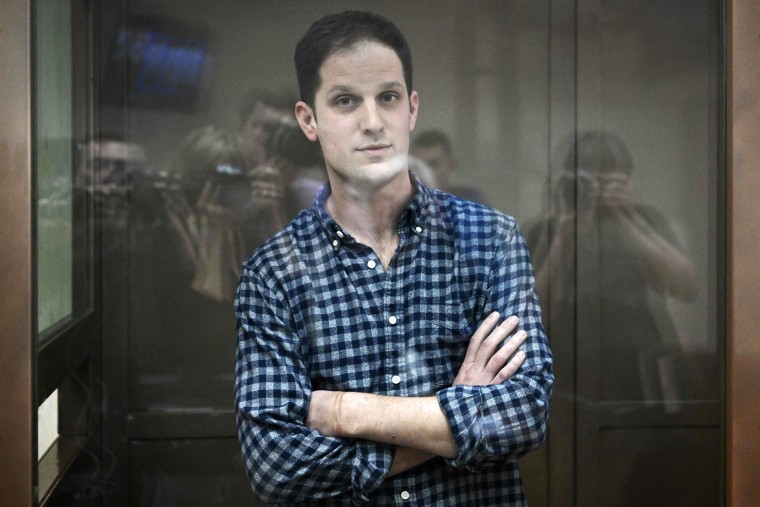
A Russian court on Tuesday upheld the detention of American journalist Evan Gershkovich on spying charges, part of a sweeping Kremlin crackdown on dissent amid the war in Ukraine. He and the U.S. government strenuously deny the allegations.
Dozens of journalists crowded together to catch a glimpse of the Wall Street Journal reporter, who is the first U.S. correspondent since the Cold War to be detained in Russia on spying allegations.
Clad in pale-blue jeans and a plaid shirt, he looked calm and even smiled at times as he stood inside a glass cage to appeal his detention. U.S. Ambassador Lynne Tracy was in the room.
The Moscow court’s decision to reject that appeal means that Gershkovich will remain jailed until he faces trial, the date for which has not yet been announced. His lawyers Maria Korchagina and Tatyana Nozhkina told reporters outside the court they don’t expect any further hearings in his case until the end of May, when the court will consider extending his pre-trial detention.
Russia’s Federal Security Service detained the 31-year-old in Yekaterinburg in March and accused him of trying to obtain classified information about a Russian arms factory.

Gershkovich, his employer and the U. S. government all deny he was involved in spying and have demanded his release. Last week, the U.S. government declared that he was “wrongfully detained” — a designation that means his case receives special attention from the State Department.
The Moscow City Court is considering a defense appeal of his detention on Tuesday.
Gershkovich could face up to 20 years in prison if convicted. Russian lawyers have said past investigations into espionage cases took a year to 18 months, during which time he could have little contact with the outside world.
He has been held in Moscow’s Lefortovo prison, which dates from the czarist era and has been a terrifying symbol of repression since Soviet times.
The arrest comes at a moment of bitter tensions between the West and Moscow over its invasion of Ukraine and as the Kremlin intensifies a crackdown on opposition activists, independent journalists and civil society groups.
The sweeping campaign of repression is unprecedented since the Soviet era. Activists say it often means the very profession of journalism is criminalized, along with the activities of ordinary Russians who oppose the war.
Last month, a Russian court convicted a father over social media posts critical of the war and sentenced him to two years in prison. On Monday, a Russian court convicted top opposition figure Vladimir Kara-Murza Jr. of treason for publicly denouncing the war and sentenced him to 25 years in prison.
The U.S. has pressed Moscow to grant consular access to Gershkovich. On Monday, Ambassador Tracy said she visited Gershkovich in prison for the first time since his detention. She said on Twitter that “he is in good health and remains strong,” reiterating a U.S. call for his immediate release.
After the ruling, Tracy told reporters outside the court that the U.S. will continue to provide all appropriate support to Gershkovich and his family.
“I can only say how troubling it was to see Evan, an innocent journalist held in these circumstances,” Tracy said, adding that she expects Russian authorities to provide continued consular access to Gershkovich.
She also called for the release of Paul Whelan, a Michigan corporate security executive who has been imprisoned in Russia since December 2018 on espionage charges, which his family and the U.S. government have called baseless.
President Joe Biden spoke to Greshkovich’s parents last week and again condemned his detention.
“We’re making it real clear that it’s totally illegal what’s happening, and we declared it so,” he said.
A top Russian diplomat said last week that Russia might be willing to discuss a potential prisoner swap with the U.S. involving Gershkovich after his trial. That means any exchange is unlikely to happen any time soon.
In December, American basketball star Brittney Griner was exchanged for Russian arms dealer Viktor Bout following her trial and conviction on drug possession charges. She had been sentenced to nine years in prison and ended up spending 10 months behind bars.

 Latest Breaking News Online News Portal
Latest Breaking News Online News Portal




